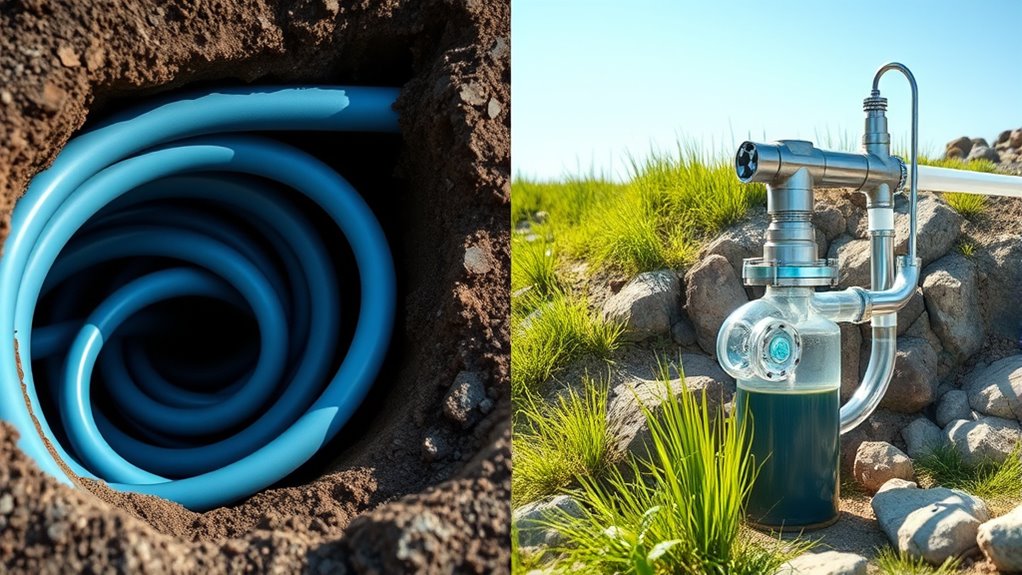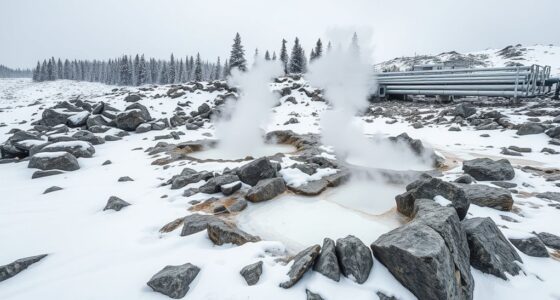Closed-loop geothermal systems circulate sealed underground pipes, offering efficient, low-maintenance heating and cooling with minimal environmental impact. Open-loop systems draw groundwater directly from wells, providing cost-effective energy but requiring water management and permits. Closed systems are more resistant to corrosion, while open systems depend on water quality and local conditions. Choosing the right system depends on your site and needs; explore further to find the best fit for you.
Key Takeaways
- Closed-loop systems circulate sealed underground pipes, offering high efficiency and minimal environmental impact, while open-loop systems use direct groundwater flow.
- Closed-loop setups are more resistant to corrosion and require less ongoing maintenance compared to open-loop systems.
- Open-loop systems are typically more cost-effective initially but depend on groundwater availability and quality.
- Closed-loop systems are suitable for sites with limited water access and environmentally sensitive areas.
- Both systems require proper design, installation, and maintenance for optimal performance and longevity.
Understanding the Basic Design of Each System
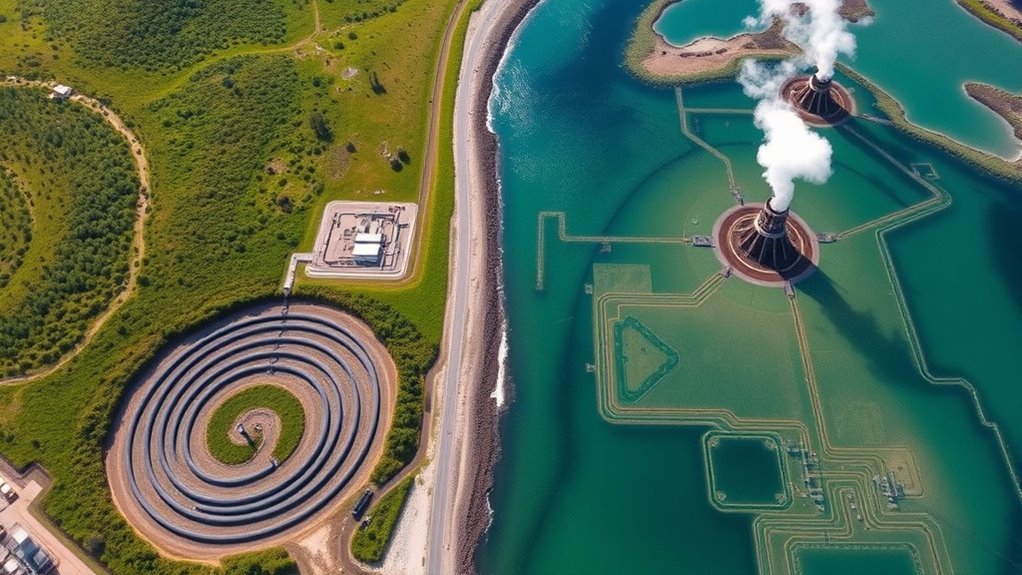
To understand the basic design of closed-loop and open-loop geothermal systems, it’s important to recognize how each system interacts with the earth to transfer heat. In closed-loop systems, geothermal fluid flow occurs within a sealed pipe network buried underground, circulating fluid that absorbs heat from the earth and transfers it to your building. This design maintains consistent geothermal fluid flow, which helps maximize system efficiency by reducing contamination and corrosion. Conversely, open-loop systems draw groundwater directly from a well, pass it through a heat exchanger, and then discharge or reinject the water. This approach relies on a continuous supply of fresh groundwater, making the geothermal fluid flow more variable. Both designs aim to optimize heat transfer, but their interactions with the earth differ markedly, affecting overall system efficiency.
Advantages and Disadvantages of Closed-Loop Systems

Closed-loop geothermal systems offer several notable advantages, making them a popular choice for sustainable heating and cooling. They typically provide high thermal efficiency, ensuring effective heat transfer year-round. Additionally, their closed nature minimizes environmental impact by preventing groundwater contamination and reducing surface disruption. However, they also have disadvantages. Installation costs can be high, especially for larger systems, and ground loop maintenance might be necessary over time. Their efficiency can decline if ground conditions aren’t ideal. Proper ground loop design is crucial to maximize performance and longevity. Here’s a quick comparison:
| Advantage | Disadvantage | Impact on Environment |
|---|---|---|
| High thermal efficiency | High initial installation cost | Minimal surface disturbance |
| Low ongoing maintenance | Potential for system degradation | Reduced risk of groundwater contamination |
| Long lifespan | Limited flexibility in location | Eco-friendly, renewable energy |
This balance makes closed-loop systems a sustainable, efficient choice, despite some upfront challenges.
Benefits and Challenges of Open-Loop Systems
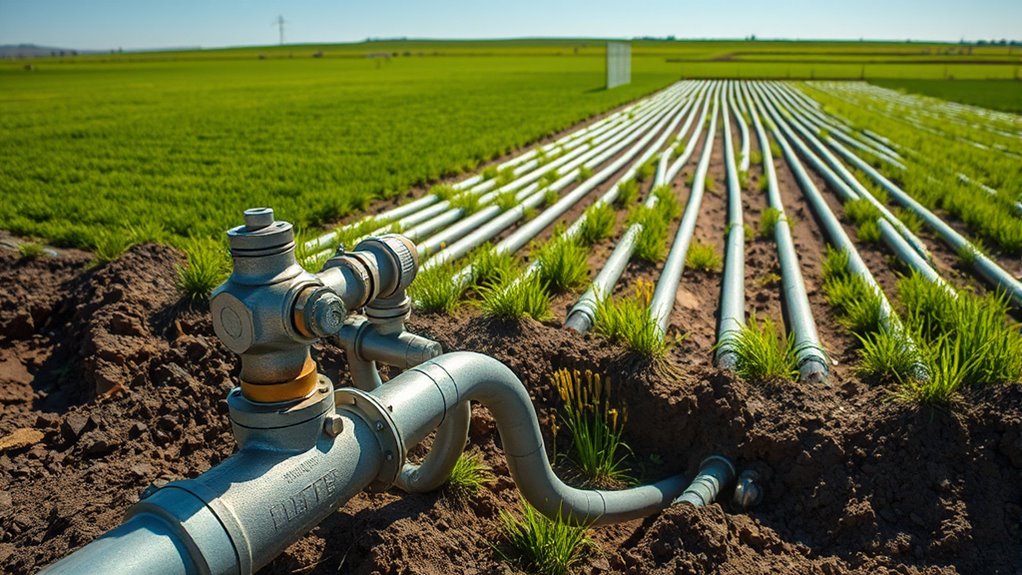
Open-loop geothermal systems harness groundwater directly from a well or aquifer to provide heating and cooling, offering a cost-effective and efficient alternative to closed-loop setups. However, they come with specific benefits and challenges. First, water quality is vital; poor water can cause scaling, corrosion, or equipment failure, impacting system longevity. Second, the environmental impact must be considered, as extracting and discharging water can affect local ecosystems and water tables. Third, open-loop systems often require permits and regular water testing to guarantee compliance and sustainability. Proper water treatment can help mitigate issues related to water quality, ensuring system durability and environmental safety. Additionally, understanding soil conditions is crucial because they influence water flow and system performance. Proper monitoring of groundwater levels can prevent over-extraction and help maintain sustainable operation. Awareness of local regulations is also essential, as they vary by region and can influence system feasibility. While they can reduce operational costs and energy use, managing water quality and minimizing environmental effects can be complex. Balancing these factors is key to maximizing benefits while mitigating potential challenges. Furthermore, implementing monitoring systems can aid in tracking water usage and system efficiency to support sustainable operation.
Factors Influencing the Choice Between the Two Types
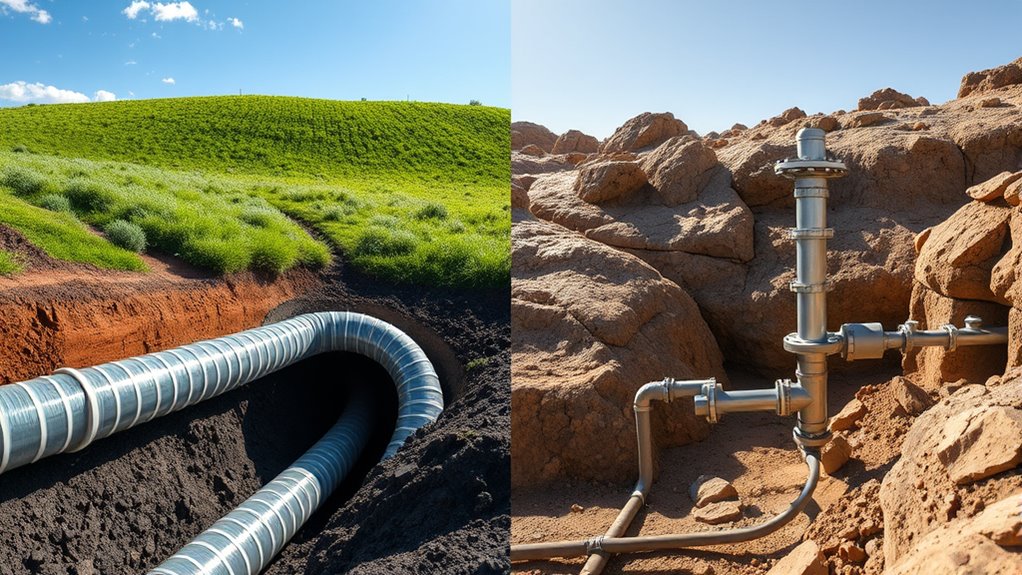
Choosing between closed-loop and open-loop geothermal systems depends on several key factors, including site conditions, budget, and environmental considerations. The environmental impact plays a significant role; open-loop systems may use more water and risk contamination if not properly managed, whereas closed-loop systems tend to be more environmentally friendly. Installation complexity also influences your choice. Closed-loop systems usually require trenching or boreholes, which can be be more straightforward in some sites but costly in others. Open-loop systems rely on well availability and water quality, making their installation more complex in areas with limited water resources. Additionally, layer textures and colors can influence the integration and aesthetic appeal of the system components within your property. Incorporating site-specific conditions such as soil type and water availability can help determine the most sustainable and efficient option. Considering water quality and potential mineral buildup is also important for maintaining system longevity and performance. The presence of active roots or underground obstructions can further impact installation and operation, necessitating careful site assessment. Moreover, understanding the system maintenance requirements can impact long-term operational costs and system reliability. Your decision should consider these factors to ensure your system aligns with your environmental goals, site constraints, and budget, ultimately delivering ideal performance and sustainability.
Maintenance and Longevity Considerations
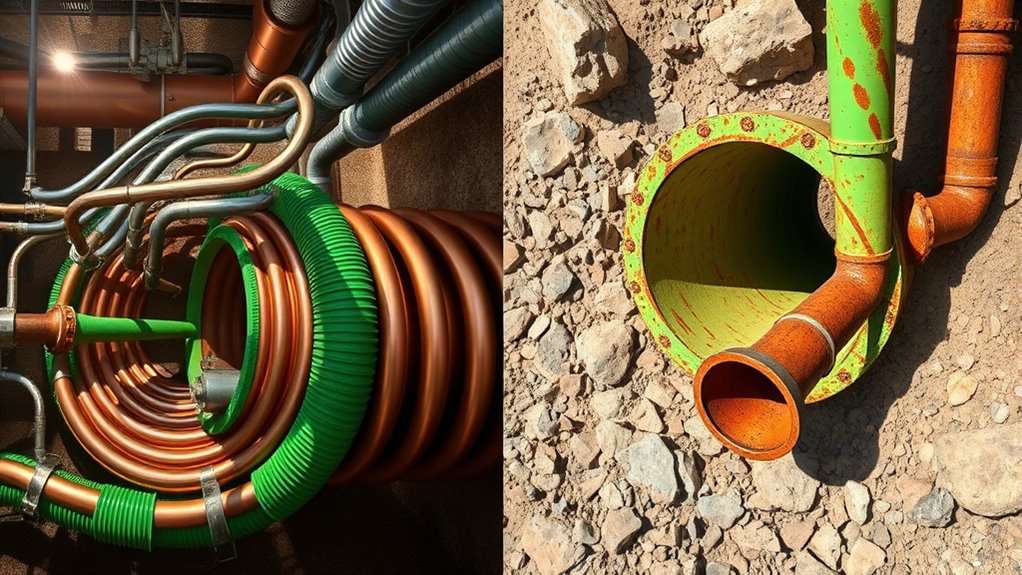
Maintenance requirements and system longevity are critical factors to contemplate when selecting a geothermal system, as they directly impact long-term performance and costs. To maximize durability, you should consider:
- Regular inspections to detect corrosion issues early, especially in open‑loop systems where water quality affects corrosion resistance. Incorporating monitoring techniques can help identify early signs of degradation before costly repairs are needed.
- Using corrosion-resistant materials to enhance system durability and reduce replacement frequency.
- Scheduling routine maintenance to prevent mineral buildup and ensure efficient heat exchange, which prolongs system life.
- Monitoring water quality in open‑loop systems is essential, as water quality factors significantly influence corrosion and system efficiency. Additionally, implementing preventive maintenance can help identify potential problems before they lead to costly repairs.
- Ensuring proper system flushing can remove accumulated deposits, reducing wear and maintaining optimal performance. Employing corrosion monitoring techniques can further help detect early signs of system degradation and extend its lifespan.
Open‑loop systems typically demand more maintenance due to water quality concerns, while closed‑loop systems benefit from sealed pipes that resist corrosion better. Proper upkeep guarantees your geothermal system remains reliable and extends its operational lifespan.
Frequently Asked Questions
How Do Climate Conditions Affect System Performance and Design Choices?
Climate conditions play a vital role in your geothermal system’s performance and design choices. You need to take into account climate adaptation to guarantee efficient heating or cooling year-round. In colder climates, you might prioritize system resilience to prevent freezing issues, while in warmer areas, optimizing heat exchange becomes essential. By tailoring your system to local climate challenges, you enhance durability and efficiency, ensuring reliable operation regardless of weather fluctuations.
What Are the Environmental Impacts of Each System Type?
Imagine the environment reacting to your choices; that’s how geothermal systems impact ecology. Closed-loop systems recycle the same fluid, reducing contamination and lowering ecological footprint, making them more eco-friendly. Open-loop systems, on the other hand, can introduce minerals and pollutants into groundwater, increasing environmental risks. Your decision influences recycling potential and environmental health, highlighting the importance of understanding each system’s impacts to minimize ecological harm.
Can Hybrid Systems Combine Features of Both Closed-Loop and Open-Loop?
You can combine features of both closed-loop and open-loop systems into a hybrid system, offering advantages like increased efficiency and flexibility. This integration allows you to optimize performance based on site conditions. However, you might face system integration challenges, such as managing different component compatibilities and ensuring seamless operation. Overall, hybrid systems can provide tailored solutions, but careful planning is essential to overcome potential technical hurdles.
What Are the Typical Upfront Costs for Each System?
You’ll find that initial investment costs vary between systems. Closed-loop systems typically require a higher upfront cost due to drilling and loop installation, but offer lower maintenance. Open-loop systems often have lower initial costs but may face higher operational expenses. When considering financing options, weigh these initial investments against long-term savings. Your choice depends on your budget, site conditions, and long-term energy goals.
How Do Local Regulations Influence System Installation Options?
When considering system installation, local regulations shape your options through zoning restrictions and permit requirements. Zoning restrictions might limit where you can place geothermal loops, while permit requirements guarantee safety and environmental standards. You must navigate these rules carefully, obtaining necessary approvals and adhering to restrictions. This process influences whether you choose a closed-loop or open-loop system, making understanding local regulations essential for a smooth installation and long-term success.
Conclusion
Choosing between closed-loop and open-loop geothermal systems can feel like a balancing act. Both have their perks and pitfalls, so it’s essential to weigh your specific needs and conditions carefully. Remember, there’s no one-size-fits-all answer—sometimes, the best solution is to go with what fits your situation like a glove. By understanding each system’s strengths and challenges, you’ll be better equipped to make a decision that pays off in the long run.
